
-
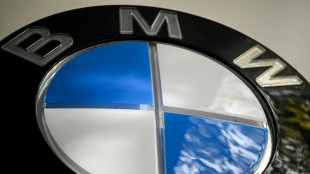 BMW reports rising profitability, shares jump
BMW reports rising profitability, shares jump
-
Bolivia Supreme Court orders release of jailed ex-president Jeanine Anez
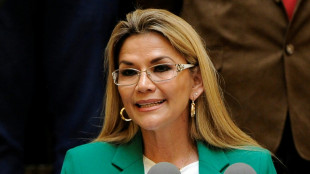
-
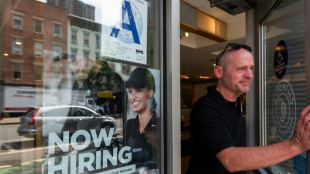 Wall Street stocks rise after positive jobs data
Wall Street stocks rise after positive jobs data
-
'Hostage diplomacy': longstanding Iran tactic presenting dilemma for West
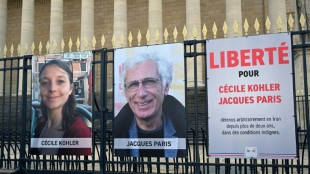
-
 Rybakina stays perfect at WTA Finals with win over alternate Alexandrova
Rybakina stays perfect at WTA Finals with win over alternate Alexandrova
-
Le Garrec welcomes Dupont help in training for Springboks showdown

-
 Brussels wants high-speed rail linking EU capitals by 2040
Brussels wants high-speed rail linking EU capitals by 2040
-
Swiss business chiefs met Trump on tariffs: Bern
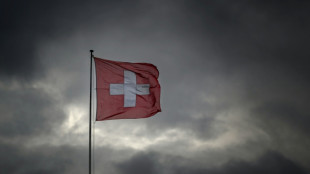
-
 Spain's exiled king recounts history, scandals in wistful memoir
Spain's exiled king recounts history, scandals in wistful memoir
-
Wall Street stocks steady after positive jobs data
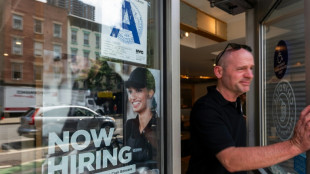
-
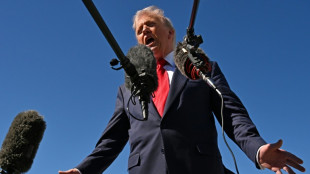 Trump blasts Democrats as government shutdown becomes longest ever
Trump blasts Democrats as government shutdown becomes longest ever
-
Indian pilgrims find 'warm welcome' in Pakistan despite tensions

-
 Inter and AC Milan complete purchase of San Siro
Inter and AC Milan complete purchase of San Siro
-
Swedish authorities inspect worksite conditions at steel startup Stegra

-
 Keys withdraws from WTA Finals with illness
Keys withdraws from WTA Finals with illness
-
Prince Harry says proud to be British despite new life in US

-
 EU strikes last-ditch deal on climate targets as COP30 looms
EU strikes last-ditch deal on climate targets as COP30 looms
-
Stocks retreat as tech bubble fears grow

-
 Shein opens first permanent store amid heavy police presence
Shein opens first permanent store amid heavy police presence
-
West Indies edge New Zealand despite Santner brilliance

-
 French pair released by Iran await return home
French pair released by Iran await return home
-
German factory orders up but outlook still muted

-
 Death toll tops 100 as Philippines digs out after typhoon
Death toll tops 100 as Philippines digs out after typhoon
-
Attack on key city in Sudan's Kordofan region kills 40: UN

-
 'No one could stop it': Sudanese describe mass rapes while fleeing El-Fasher
'No one could stop it': Sudanese describe mass rapes while fleeing El-Fasher
-
Champagne and cheers across New York as Mamdani soars to victory

-
 Medieval tower collapse adds to Italy's workplace toll
Medieval tower collapse adds to Italy's workplace toll
-
BMW boosts profitability despite China, tariff woes

-
 South Africa's Wiese wary of 'hurt' France before re-match
South Africa's Wiese wary of 'hurt' France before re-match
-
Beyond limits: Croatian freediver's breathtaking record

-
 Tottenham supporting Udogie after alleged gun threat in London
Tottenham supporting Udogie after alleged gun threat in London
-
Thunder roll Clippers to stay unbeaten as SGA keeps streak alive

-
 In appeal, Australian mushroom murderer alleges 'miscarriage of justice'
In appeal, Australian mushroom murderer alleges 'miscarriage of justice'
-
Toyota hikes profit forecasts 'despite US tariffs'

-
 Ex-France lock Willemse challenges Meafou to become 'the bully'
Ex-France lock Willemse challenges Meafou to become 'the bully'
-
Ukrainians to honour sporting dead by building country they 'died for': minister

-
 At least 7 dead after UPS cargo plane crashes near Louisville airport
At least 7 dead after UPS cargo plane crashes near Louisville airport
-
US Supreme Court hears challenge to Trump tariff powers

-
 US government shutdown becomes longest in history
US government shutdown becomes longest in history
-
India's Modi readies bellwether poll in poorest state

-
 Green goals versus growth needs: India's climate scorecard
Green goals versus growth needs: India's climate scorecard
-
Where things stand on China-US trade after Trump and Xi talk

-
 Sri Lanka targets big fish in anti-corruption push
Sri Lanka targets big fish in anti-corruption push
-
NY elects leftist mayor on big election night for Democrats

-
 Injured Jordie Barrett to miss rest of All Blacks tour
Injured Jordie Barrett to miss rest of All Blacks tour
-
Asian markets tumble as tech bubble fears grow

-
 Pay to protect: Brazil pitches new forest fund at COP30
Pay to protect: Brazil pitches new forest fund at COP30
-
Iraq's social media mercenaries dying for Russia

-
 Young leftist Trump foe elected New York mayor
Young leftist Trump foe elected New York mayor
-
Concerns at ILO over expected appointment of close Trump advisor


Brussels extends use of controversial herbicide
The European Commission said Thursday it will allow the use of the controversial herbicide glyphosate for another 10 years, breaking a stalemate between EU states divided over its safety.
Glyphosate is one of the most widely used weedkillers in the world but critics point to evidence it may cause cancer and constitutes a risk to biodiversity.
The World Health Organization in 2015 classed glyphosate as "probably carcinogenic", spurring concerns about its continued use.
The previous European Union authorisation expired in December 2022 but was extended until December 15 this year pending a scientific study of the herbicide.
The European Food Safety Authority (EFSA) in July ended up saying it had not found "any critical areas of concern" preventing glyphosate from being reauthorised, sparking a backlash from environmental groups.
EFSA did note, however, that it had "data gaps" in reaching its assessment.
The European Commission brandished the EFSA finding as justification for continued use of glyphosate until December 2033.
It said it was forced to act now, after an October vote between EU member states and a final vote in an appeals committee on Thursday both ended in stalemate, with an insufficient weighted majority for or against.
It said it "will now proceed with the renewal of the approval of glyphosate for a period of 10 years, subject to certain new conditions and restrictions".
Those include buffer zones around fields sprayed with glyphosate and equipment to prevent the spray drifting to other areas, and urging EU countries to pay "particular attention" to effects on the environment on the herbicide's use.
- Bayer hails decision -
German chemicals giant Bayer, which uses glyphosate in its popular herbicides such as Roundup, acquired it when it bought US company Monsanto, "hailed and welcomed" the commission decision.
"This new authorisation will allow us to continue to supply farmers across the European Union with important technology for the integrated fight against weeds," a spokesman said.
But the chair of the European Parliament's environment, public health and food safety committee, Pascal Canfin, told AFP he viewed the decision as "absolutely unacceptable from a political point of view".
He noted that the renewed licence for glyphosate did not have the backing of the EU's biggest agricultural countries France, Germany and Italy, and the commission still had another month to try to come up with a workable compromise.
The EU executive could have presented "something more balanced that could have got the backing of Germany and the backing of France," said the French MEP.
In the vote Thursday, France, Germany, Italy, Belgium and the Netherlands abstained, and three countries -- Austria, Croatia and Luxembourg -- voted against a renewal.
That meant there was no qualified majority, which requires 15 out of the 27 EU countries, representing at least 65 percent of the total EU population.
France's agriculture ministry said Paris was "not against the principle of the renewal" but "regrets" that the commission did not take into account propositions to restrict its use.
A commission spokesman, Eric Mamer, said the executive believed it was "not possible to reach an agreement" among member states by December 15 so it was obliged to act.
P.Staeheli--VB




